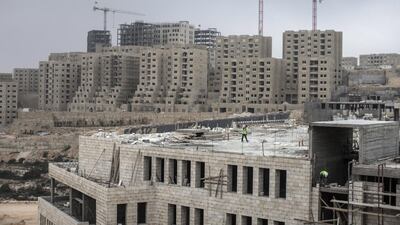RAMALLAH // Palestinian President Mahmoud Abbas will push for a UN Security Council vote this week on a resolution setting a November 2016 deadline for ending Israeli occupation.
The move could set the stage for a Security Council clash over the Jordanian-backed resolution, or over a second proposal by France, which seeks a two-year deadline for Israeli-Palestinian negotiations on the terms of Palestinian statehood.
The Palestinians’ decision came after Mr Abbas consulted members of his Fatah movement and the Palestine Liberation Organization on Sunday.
Participants of the meeting decided to push for a vote on Wednesday on the Jordanian proposal, PLO official Wasel Abu Yousef said on Monday. They set another meeting for Tuesday night, however, suggesting that this decision might change.
Another Palestinian official said the Jordanian proposal only has the support of seven members of the 15-strong Security Council, meaning it would be defeated without triggering a US veto.
Despite the Palestinans’ statements however, Jordan said it had no immediate plans to push for a vote on the resolution.
The country’s UN ambassador, Dina Kawar, said she was awaiting the outcome of diplomatic meetings that US Secretary of State John Kerry is holding this week to discuss the proposed resolutions.
Ahead of a meeting with Mr Kerry in Rome on Monday, Israeli Prime Minister Benjamin Netanyahu rejected the Jordanian-backed bid, saying: “We will not accept attempts to dictate to us unilateral moves on a limited timetable.”
The US opposes moves to bind negotiators’ hands through a UN resolution - particularly any attempt to set a deadline for the withdrawal of Israeli troops from the occupied West Bank.
But US officials accompanying Mr Kerry in Rome said that Washington has not yet decided whether to veto or back the French-led initiative.
Mr Kerry will also meet two of Mr Abbas’ aides in London on Tuesday.
Following news of the Palestinians’ decision, the UN’s special co-ordinator for the Middle East peace process, Robert Serry, warned that Security Council resolutions addressing the Israeli-Palestinian conflict cannot be a substitute for peace negotiations between the two sides.
He said that council action would be a “major step” however, and that Secretary-General Ban Ki-moon hopes it will spur renewed talks.
The Palestinian push at the Security Council is largely symbolic. Mr Abbas is under pressure after US-led talks between Israel and the Palestinians collapsed in the spring.
Palestinians seek a state in the West Bank, Gaza and east Jerusalem, lands that Israel captured in 1967. The UN General Assembly recognised such a state as an “observer” in 2012. In recent weeks, parliaments of several European countries have recommended to their governments to recognise a state.
Mr Netanyahu has said an Israeli withdrawal from the West Bank could pave the way for a Hamas takeover there, as it did in Gaza after Israel’s 2005 pullout.
Also on Monday, Israel’s internal security service said it had arrested five Palestinians for planning attacks including a suicide bombing in Tel Aviv.
The suspects from the town of Atil, near Tulkarem in the northern West Bank, were arrested in October and November, the Shin Bet said. The suspects were also planning to blow up a military bus and kidnap an Israeli soldier.
The Shin Bet said there was a “high level of motivation among terrorist militants” after the July and August Gaza war, which killed nearly 2,200 Palestinians, mostly civilians, and 73 Israelis, the majority soldiers.
The Shin Bet said that Hamas and Islamic Jihad planned to claim the Tel Aviv suicide attack if it had gone ahead.
Israel also indicted three members of a Jewish extremist group on Monday for setting fire to a bi-lingual school in Jerusalem where Jews and Arabs study together.
The indictment accuses Yitzhak Gabai of Jerusalem and Shlomo and Nachman Twito, both residents of the ultraorthodox West Bank settlement Beitar Ilit, of setting fire to the school late last month and writing racist slogans on its walls.
Prosecutors say the three are members of “Lehava,” a group opposed to Jewish assimilation and coexistence between Jews and Arabs.
* Associated Press and Agence France-Presse

